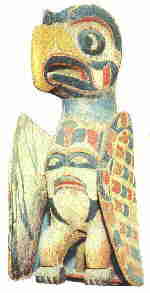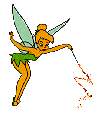Northwest Indians
The native Americans of the northwestern sections of
the continent, from Alaska down to northern California can be considered
as having a common culture. These peoples were heavily involved in the
use of the natural resources they found in this area. Hunting and fishing
were the common food sources as both were plentiful. The fishing in fact
was often carried out from large dug out canoes which could hold up to
30 people. The fish were plentiful, as large scoals of salmon would run
up into the rivers and streams where there would be trapped by the thousands.
The native peoples did not only consume the fish caught, but they would
also dry a great deal of the fish for later consumption. It should be noted
that in the way of all cultures that live in harmony with nature, all things
provided was used, and so to would the oil from the drying salmons, which
would be captured during the process.
 |
|
THE TOTEM: Perhaps most recognizable of the artifacts
of these people is that of the Totem Pole. These poles were often used
in the construction of the family dwelling, and also were often created
to honor a person, record an event or to symbolize some special privilege.
The Totem also served to strength and maintain the social structure of
the civilization. The villages (up to 1000 persons) were divided into family
units or clan (not unlike the Scottish society) and the Totems served to
represent to which "clan" the family belonged. If in a time of
peace, if another Indian came into the village, he would know to which
family he could go to seek food and lodging, and also protection from the
others in the camp. He would be accepted as a kinsman. This activity accomplish
a number of things, but first among them it ensured that the beliefs and
stories of the spirits, origins of fire etc. preserved and common.
War among the tribes and the Totemic clans was very
common during the periods when gathering of food was not necessary. There
was a great pride taken in the military victory of one tribe over another,
and so any stratagem was acceptable against the enemy. Often quite elaborate,
the raids proved deadly to the tribe attacked, or perhaps worse yet, the
vanquished found themselves enslaved. The slaves although mostly treated
kindly were chattel to the owner, and it was not uncommon for an owner
to have them beat to death during some festival as a sign of his power
before visiting groups.
|
There is a very interesting story of the origins of the Nez Perce people with is called Coyote and the Monster of Kamiah which tells of the time before the coming of man, and the battle between Coyote and a great monster. It would tell you of how the monster was overcome, and how the remains were devided to give the attributes of the different tribe an origin. Take a moment to read the story as it show a wonder and rich heritage of stroy telling which was the back bone of these societies.
The lady HANGING HAIR:One legend out of the area deals with "Keagyihl Depguesk" a dangerous whirlpool. The people living in the region of Kaegyihl Depguesk were saddened as a great number of their young men were being taken by the whirlpool when they went out to fish for the tribe. As fate would have it just across the river was a kind spirit called HANGLING HAIR, and she called a great feast of all the great monster powers of the area to intercede on behave of the people. All the powers came in and demonstrated his skills, like falling as cliffs or freezing as pieces of ice or burning like forest fires. At the feast, each had his place, and after fed all being in a good mood, lady Hanging Hair suggested that it was time to be considerate of the people, who made offering to the spirit of the whirlpool. After debate it was agreed to shake the earth so that a high bluff which deflects the water of the river, should be moved to a new place thereby reducing the flow water into the whirlpool. Soon the earth shook, the wind blew and the forest fires burned the trees, all in such a way that no one was hurt, but when the storms were completed, the bluff had been broken down and the river was now quiet and broad. The whirlpool was no more, and instead was a gentle eddy that actually helped the fisherman on their way.
If you haven't signed myGuest Bookplease do.
And with a sprinkle of Fairy dust you return to
Neverland
or return to see other Native American stories press here

This page hosted by  get your own Free home page
get your own Free home page

